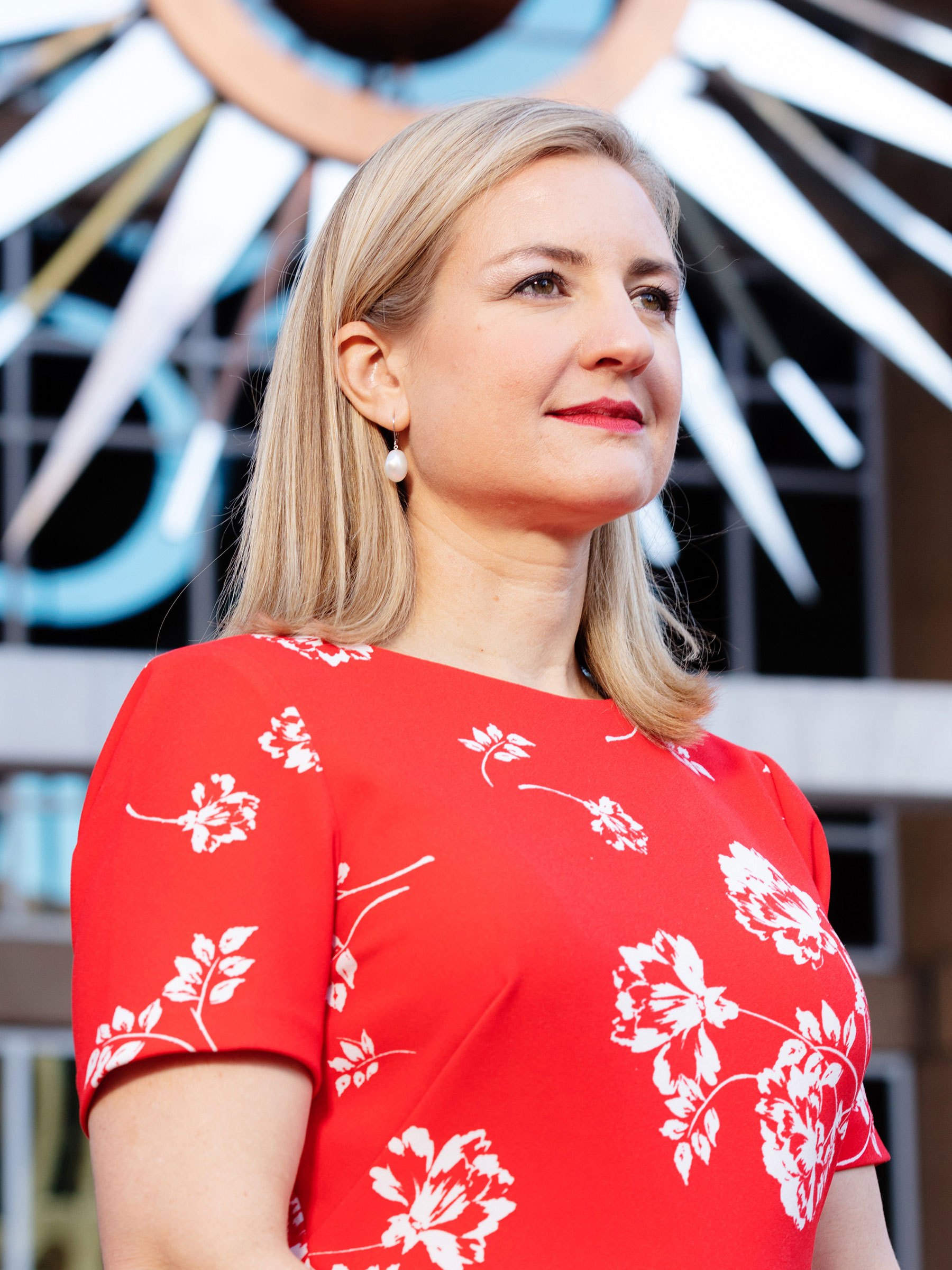
This article is part of The D.C. Brief, TIME’s politics newsletter. Sign up here to get stories like this sent to your inbox.
Phoenix Mayor Kate Gallego was a first-term mayor, one of the youngest big-city chiefs in the country and a rare woman atop the local political scene, when the Covid-19 crisis landed on her desk in early 2020. Arizona was—and is—fertile ground for Trumpian denialism about the pandemic, a place where a statewide mask mandate never materialized and any restrictions put in place were decided locally and inevitably drew the vocal ire of those who doubted the reality of a deadly threat. Put bluntly: this wasn’t what she signed up for, but it was suddenly front of mind as she and her young son sheltered in place early in the pandemic.
So when she heard protesters were planning on gathering at her home—”the mayor’s mansion” she says with sarcasm—she didn’t know what the proper etiquette was. “What do you do for this? Do you call your neighbors?” she said as we had coffee this week on the sidelines of the national mayors’ summit in D.C. “It was quite the rookie term.”
Gallego, who is now 41, was re-elected in the fall of 2020 in a landslide and is now settling into her role leading America’s fifth largest city, a place that is growing faster than any other urban track in the country and boasting some speedy political changes. Arizona for decades was where independent Westerners thumbed their noses at convention, where Senators Barry Goldwater and John McCain held court and frustrated Washington to no end. But the state broke for Joe Biden in 2020, prompting fringe conspiracies and contemptuous non-concessions to proligerate for years since. Both Arizona’s politics and its needs are changing as tech companies and sunbirds alike move there, which also means the to-do list of its cities is shifting; climate change, school shootings, mental health crises, even international diplomacy all found their way onto the agenda for the U.S. Conference of Mayors meeting this week.
“We have a major semiconductor facility from Taiwan. We get feedback from the Chinese government about that,” the Harvard- and Penn-educated Gallego says. “We live in a global world and we have to understand what that means.”
As much as Washington likes to think of itself as the most important political base for the country, the truth is that so much of this nation’s governance actually takes place in its cities. D.C. can set the national agenda, issue rules and regulations that trickle down to local arenas, and task states and cities with new benchmarks or face defunding. But most of the ways Americans interact with government of any sort is through their cities: trash pick up, utilities, schools, traffic, parks—all overwhelmingly run by local governments. It’s why the hallways at the Hilton just north of the White House this week could have been mistaken for a Cabinet meeting with so many members of the Biden administration leading panels and meeting privately with city CEOs about upcoming projects and dreams in the pipeline.
That proximity to constituents has groomed some of the best politicians in this country. When Pete Buttigieg—a Gallego pal from her undergraduate days in Cambridge, Mass.—ran for president in 2020, his familiarity with day-to-day issues as mayor of South Bend, Ind., gave him a leg-up over House and Senate members who could navigate the subcommittee machine but maybe not the complexities of daycare drop-offs. Similarly, Cory Booker and Julián Castro both banked time as city mayors with more caché than their stays in Washington. Even former New York Mayor Rudy Giuliani used his 9/11 aura to start the 2008 presidential race as its doomed frontrunner. Decades in Washington can be of benefit when writing policy, sure, but most voters just want someone who can show they can make life easier. Put plainly, no one cares about a subsection of a bill if a public holiday screwed up the trash trucks.
“You see the wins sooner. If you’re a member of Congress, you could work on a piece of legislation for six years before it passes. We do things every week that we can see and it’s tangible,” Gallego says. But it often comes with far less of a buffer than the often-anonymous members of Congress enjoy. “You have moments when you’re getting a gynecological screening and someone wants to talk to you about an issue they’re having with the city. You’re always on,” she says with a half-shrug as we finish our coffees.
So as the mayors wrap their annual week in Washington on Friday with a stop at the White House for a session with President Biden, it’s worth taking a beat and appreciating the work they are doing to lead the country on a granular level. As much as D.C. can puff its chest and flex its unmatched economic muscle, the cities are the places that actually have to administer the programs most Americans know.
“Some of the best advice I have gotten is: you have to spend time on what’s important, not what’s urgent,” Gallego says. “There’s always a broken waterline or a street-construction issue you have to deal with. A good mayor thinks about the longtime projects even though the day-to-day can be so pressing.”
It’s advice Washington might do well to heed.
Make sense of what matters in Washington. Sign up for the D.C. Brief newsletter.
More Must-Reads from TIME
- Why Biden Dropped Out
- Ukraine’s Plan to Survive Trump
- The Rise of a New Kind of Parenting Guru
- The Chaos and Commotion of the RNC in Photos
- Why We All Have a Stake in Twisters’ Success
- 8 Eating Habits That Actually Improve Your Sleep
- Welcome to the Noah Lyles Olympics
- Get Our Paris Olympics Newsletter in Your Inbox
Write to Philip Elliott at philip.elliott@time.com